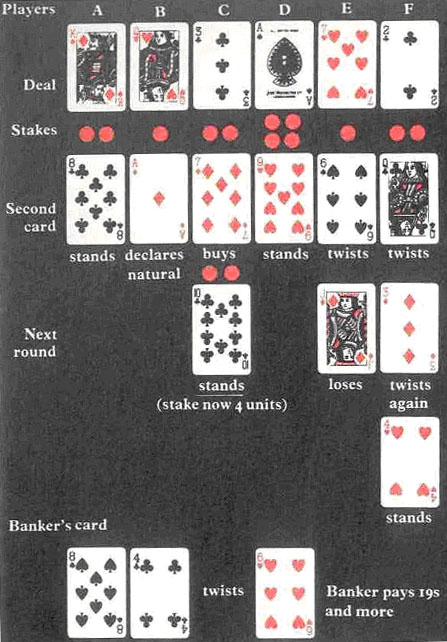VINGT-ET-UN
VINGT-ET-UN, or Twenty-one, is a leading game in the casinos of America where it is known as Black Jack. Although it is a game of chance, in which the odds on winning are heavily in favour of the banker, in Great Britain it is far more of a social pastime and, under the name of Pontoon (almost certainly an easy corruption of punting) it was exceptionally popular in the trenches during the First World War.
NUMBER OF PLAYERS
Any number up to ten may play (or more if two packs of cards are used).
CARDS
The full pack of 52 cards is used (but see above).
THE PLAY
The banker deals one card face downwards to each player and to himself, and the players, after looking at their cards, stake any amount up to the agreed maximum.
The object of the game is to obtain a total of 21, or as near to it as possible, but without exceeding it. for this purpose an Ace counts 11 or 1 (at the option of the holder) a court card 10, and any other card its pip value.
When the player have made their bets, the dealer banker rules looks at his card, and has the right to double. In this event the players must double their bets.
The banker then deals another card, face downwards, to all the players and to himself. If a player holds a pair he may announce his intention to split. He stakes the same amount as his original bet on both cards, and the banker deals a second card to each. The player plays both hands separately. The banker may not split pairs.
If the banker does not hold a natural, but a player does, the banker pays him double his stake, and after the deal has been completed, the bank passes to him.
The bank, however, does not pass on a split natural. If two or more players hold naturals, the one nearest to the banker’s left takes the bank.

Banker pays B(double), c,D, and F. Banker wins from A and E. Banker loses 9 units on deal.
When all naturals (if any) have been declared and settled, the banker asks each player in turn (beginning with the one on his left) whether he wants more cards. He may Buy; that is he increases his stake for the advantage of receiving a card face downwards. He may Twist; that is he does not increase his stake and receives a card face upwards.
The rules to be observed are:
A player may not stand if he holds a count of 15 or less.
A player may not buy for more than his original stake.
If a player has twisted a third card he may not buy a fourth or fifth, though a player who has bought a third card may twist subsequent cards.
A player may not increase, though he may decrease, the amount for which he bought a previous card. If a player has received four cards he may not buy a fifth if the total of his four cards is 11 or less.
Five cards is the most that a player may hold, and if they total 21 or less the banker pays him double, unless the banker also hold five cards that total 21 or less when the banker wins.
The player who makes a total of 21 with three 7s, receives triple his stake from the banker. The banker does not have this privilege.
When the total of a player’s cards exceeds 21 he turns his cards face upwards and the banker wins all that he has staked.
When all the players have received cards, the banker turns his two cards face upwards and deals himself as few or as many cards as he chooses. If when doing so he exceeds a total of 21 he pays the players their stakes.
At any time, however, he may elect to stand and agree to pay those poker players who have a higher total and receive from those who have a lower or equal total.
